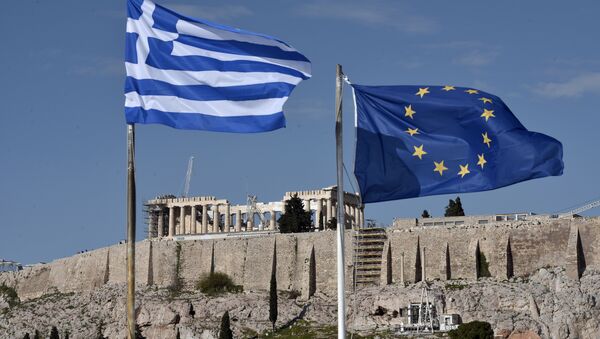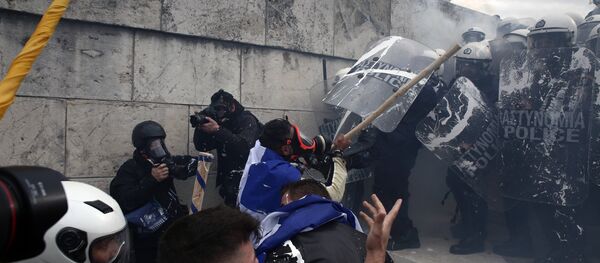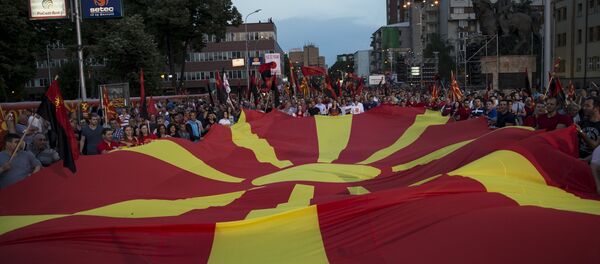The debate will conclude with a vote on Thursday evening if the question of non-confidence in the government is not raised on Wednesday. According to sources from the largest opposition party New Democracy, its leader Kyriakos Mitsotakis may raise the question of a non-confidence vote at the beginning of the session. Intense debates are expected in the parliament.
The Greek government planned to ratify the agreement in March but then decided not to wait any longer and immediately brought it up for discussion.
The adoption of the draft bill named "the Final Agreement for the Settlement of the Differences as described in the United Nations Security Council resolutions 817 (1993) and 845 (1993), the Termination of the Interim Accord of 1995 and the Establishment of a Strategic Partnership between Greece and the former Yugoslav Republic of Macedonia of 17 June 2018, also known as the Prespa Agreement" requires the approval by the majority of lawmakers present during the discussion.
However, Greek Prime Minister Alexis Tsipras said that the government intended to get at least 151 votes.
READ MORE: Majority of Greeks Against Macedonia Name Change Deal — Scholar
Parliament Speaker Nikos Voutsis confirmed earlier that all interested lawmakers would be able to participate in the debate.
The agreement has already changed the political landscape in Greece, leading to the collapse of the government coalition and the withdrawal of the right-wing Independent Greeks (ANEL) party. Party leader Panos Kammenos resigned from the defence minister post. In this regard, Tsipras called a vote of confidence in the government and won it with a majority of 151 in the 300-seat parliament.
During the two-day debate in the Committee of National Defense and Foreign Affairs, Deputy Foreign Minister Georgios Katrougalos appealed to all political forces for "a sense of national ownership and sincerity." He also called the opponents of the agreement "speculators on patriotism."
Opposition parties that voted against the Prespa Agreement demanded to see the final revised text of the neighbouring country’s constitution.
The final text of the amended constitution of "Northern Macedonia" has not yet been published.
New Democracy’s Shadow Foreign Minister Georgios Koumoutsakos warned the government that the Prespa Agreement did not have either formal or political legitimacy. He also accused the government of "identifying national feelings with the extreme right."
A rally near the parliament is planned for the day of voting in Athens.
READ MORE: Some 60,000 Rally Against Macedonia Name Change Deal in Athens (PHOTOS, VIDEO)
On Sunday, at least 100,000 people took part in a rally against the name change deal in Athens. It ended with riots, as the police used tear gas after about 200 people tried to break through to the parliament. People were forced to leave the square in front of the parliament.
The agreement, which Athens and Skopje signed on June 17, 2018, on the Greek shore of Lake Prespa, was called the Prespa Agreement. It resolves the longstanding dispute and is supposed to lift the veto on Macedonian entry to the European Union and NATO.
However, it is criticized both in Greece and in Macedonia itself. In Greece, some believe that only residents of the historical region in the northern part of the country can be called Macedonians, and certainly not the residents of the neighbouring state. Some in Skopje believe that the agreement destroys the national identity of the people.
Prior to that, a referendum was held in Macedonia and failed. Despite massive pressure from Western politicians, less than 40 percent of the population participated in the voting. Dozens of European, NATO and US high-ranking politicians and officials — presidents, vice-presidents, chancellors, general secretaries and ministers — visited Skopje. They all demanded to support the agreement, which allows the country to join NATO and the European Union.
Some Western politicians threatened that Macedonia would become either North Macedonia or North Korea.
Russia's Position
The process of adopting the agreement was criticized in Moscow.
Moscow does not oppose the new name for Macedonia, but there is the issue of the legitimacy of the ongoing process, which may be due to the goal of driving all the Balkan countries into NATO as soon as possible, Russian Foreign Minister Sergei Lavrov said on January 16.
"We ask questions about how legitimate this process is and to what extent it is really conditioned by the desire to find a consensus between Greece and Skopje, or it is conditioned by the US desire to drive all Balkan countries into NATO as soon as possible and stop any Russian influence in that region", Lavrov said.
READ MORE: Macedonia: Former Leader on the Lam
According to him, Russia has always actively supported the dialogue between Greece and Macedonia, and has always advocated for a solution to be found in a way that would be acceptable to the public, nations, and governments, and Russia does not oppose the name that eventually appeared and was announced — the Republic of North Macedonia.





